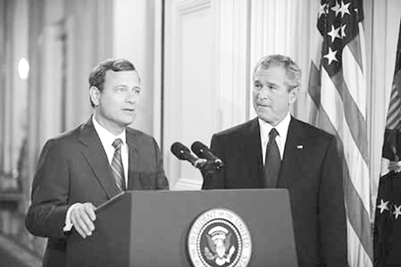Reaction from gay, AIDS groups ranges from skepticism to outright opposition
Many gay and AIDS groups are greeting the nomination of Judge John G. Roberts to replace Justice Sandra Day O’Connor on the U.S. Supreme Court with considerable concern and they are calling for a complete airing of his views during the confirmation process.
“There is a lot that we don’t know about this nominee’s views on LGBT issues,” said Christopher Labonte, legislative director at the Human Rights Campaign (HRC), the nation’s largest, gay lobbying group. “I think that most groups that I have spoken with have indicated that we need a full, thorough and rigorous exploration of his judicial philosophy.”
The fact that Roberts, 50, was immediately lauded by conservatives following his nomination and in light of Pres. George W. Bush’s record on nominating right-wing candidates for federal district and appeals courts, gay and AIDS groups are being very careful.
“We know the history of other nominees that this president has put forth for lower courts and the past can often be prologue,” Labonte said.
The blizzard of press releases from gay and AIDS groups following the announcement on July 19 have generally adopted that cautious tone. The one exception is the Gay Men’s Health Crisis (GMHC), which flatly opposed Roberts for the Supreme Court.
“Judge John Roberts cannot be given the opportunity to make law for what may well be the next 30 years,” the AIDS agency said in a statement. “GMHC urges members of the Senate Judiciary Committee to reject his confirmation. The job of the committee and the full Senate is not to ensure an easy hearing or smooth proceedings, but to advise and consent, or withhold that consent if need be.”
GMHC argued that Roberts’ support for federal regulations that barred doctors in federally-funded programs from discussing abortion and for religious activities in public schools made him unfit for the high court.
Roberts took a seat on the U.S Court of Appeals for the District of Columbia Circuit in 2003. Earlier nominations of Roberts to that court, in 2001, and by the first Pres. Bush, in 1992, were allowed to die in committee by Senate Democrats, then in the majority. Throughout the 1990s, Roberts was a partner at Hogan and Hartson, a Washington, D.C. law firm, where he represented corporate clients.
The Center for Responsive Politics (CPR), a non-partisan group that tracks political influence and campaign donations, said Roberts had “a modest record of campaign giving.”
He has given roughly $3,700 to George W. Bush and three other Republicans. Roberts gave another $7,450 to the Hogan and Hartson political action committee, which has given “$2.3 million since 1989 in individual, PAC and soft money contributions, 56 percent to Democrats,” according to CPR.
Like many in Washington, Roberts has moved between government and the private sector. He served in the White House counsel’s office and the justice department during the Reagan administration.
Roberts was in the justice department during the first Bush administration. It was during that time that he co-authored a brief that argued that the Supreme Court should overturn Roe v. Wade, the 1973 Supreme Court decision that made abortion legal.
Salon.com, a Web site, quoted Roberts saying during a 2003 confirmation hearing “Roe v. Wade is the settled law of the land… There’s nothing in my personal views that would prevent me from fully and faithfully applying that precedent.”
Roberts was educated at Harvard College and earned his law degree from Harvard Law School. William P. LaPiana, the Rita and Joseph Solomon professor of Wills, Trusts and Estates at New York Law School, knew Roberts at Harvard in the late 70s.
“He was an undergraduate when I was a resident advisor,” he said. “I was his pre-law advisor, although I don’t think I ever gave him any law advice.”
LaPiana, who is gay, recalled that Roberts was “extraordinarily bright,” “a very nice guy,” a “hardworking student” and “liked history a lot.” He could not recall Roberts expressing any opinions about the gay community.
“It’s pre-Ronald Reagan,” LaPiana said. “The single biggest issue for undergraduates was investments. Harvard was supposed to divest from South Africa.”
While very little is known about Roberts’ views on the law, Kevin Cathcart, executive director of Lambda Legal, said his organization was already worried about some parts of his record.
“While we are continuing our review of Judge Roberts, we already know that we have reasons for serious concern,” Cathcart said in a press statement. “There are a number of issues that are important in determining whether a nominee will respect the rights of all Americans. Judge Roberts’ track record on reproductive freedom, privacy and federalism (respect for Congress’ power to enact important statutes like civil rights laws) merits particular scrutiny.”
Roberts has participated in just one opinion on an AIDS or gay issue since becoming a federal judge.
In 2004, Roberts and two other appeals court judges reversed a lower court ruling against a woman who was suing Pallotta Teamworks and a local hospital after her daughter died during one of the bike rides that Teamworks organized to raise funds for AIDS groups. Michael Petrelis, the longtime gay and AIDS activist, circulated the opinion in the hours after Roberts’ nomination was announced.
The lower court had dismissed the case against Teamworks and the hospital after they pointed out that the daughter had signed a waiver on any negligence claims.
The appeals court ruling was highly technical and argued that the lower court had mistakenly applied the laws of the District of Columbia, where the waiver was signed, instead of Virginia, where the death happened. The case was remanded “to the district court for further proceedings.”
The conventional wisdom in the mainstream press, which forgets that Democrats have twice rejected Roberts for court seats, is that because Roberts is known as an amiable man with broad Washington experience, it will be that much harder for Democrats to reject him. Lambda took issue with that reasoning.
“Some have suggested that Judge Roberts is well-liked, but with all due respect, we need to know if he will stand up for the rights of all Americans not whether some people think he’s a nice guy,” Cathcart said in the press statement.
The group said the confirmation process could get ugly.
“In nominating Judge John G. Roberts to replace Justice O’Connor on the Supreme Court, Pres. Bush has just about guaranteed that divisiveness will continue to reign in the judicial nomination process.” Cathcart said.
gaycitynews.com


































